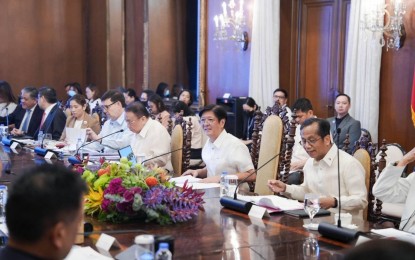
LEGISLATIVE PRIORITY. President Ferdinand R. Marcos Jr. convenes the 4th Legislative-Executive Development Advisory Council (LEDAC) meeting in Malacañang on Tuesday (March 19, 2024). During the meeting, leaders of both houses of Congress vowed to pass the remaining priority bills of the administration. (Presidential Communications Office Photo)
MANILA – A total of 14 priority measures of President Ferdinand R. Marcos Jr. that were included in the Common Legislative Agenda (CLA) of the Legislative-Executive Development Advisory Council (LEDAC) have so far been enacted into law, Malacañang said Tuesday.
In a statement, the Palace said there are currently 43 remaining CLA bills that have yet to be passed into law.
The enacted priority measures were the SIM Card Registration Act; Postponement of Barangay/SK elections; Strengthening Professionalism in the AFP (Armed Forces of the Philippines); New Agrarian Emancipation Act; Maharlika Investment Fund; Trabaho Para sa Bayan Act; Public-Private Partnership Code of the Philippines; Regional Specialty Centers; Automatic Income Classification of Local Government Units; Internet Transactions Act; Ease of Paying Taxes Act; Tatak Pinoy (Proudly Filipino) Act; Philippine Salt Industry Development Act; and New Philippine Passport Act.
Earlier this year, 21 bills were identified by the LEDAC as “priority measures” for passage by June this year but were eventually narrowed down to 15 considering the limited remaining session days.
The LEDAC, however, moved to add five more priority measures that will support social and economic initiatives to be passed by June 2024.
These include Open Access in Digital Transmission Act, Enterprise-based Education Program (Apprenticeship Act), CREATE MORE (Corporate Recovery and Tax Incentives for Enterprises to Maximize Opportunities for Reinvigorating the Economy), An Act Creating the Department of Water Management, and Amendments to the Universal Health Care Act.
Remaining priority bills
During the LEDAC meeting, Senate President Juan Miguel Zubiri committed to passing all the administration’s priority measures by June this year.
“So ‘yan ang commitment namin sa (That is the commitment we gave the) House of Representatives together with the President. But we’re on track to pass all of these by June,” he said.
Meanwhile, House Speaker Martin Romualdez said all the LEDAC priority measures have been completed and transmitted to the Senate.
“At ‘yung dahilan kung bakit nauna po kami kaya kailangan tapusin naman natin talaga yung House bago i-akyat natin sa Senate. Kaya parati nating tinutukan ‘yung ating mga LEDAC priority measures para hindi madedelay ang deliberasyon sa Senate kaya parating hindi naman sa minamadali pero ino-overtime talaga natin sa House (We really have to finish it first at the House before we elevate it to the Senate. That is why we always focus on LEDAC priority measures so deliberations at the Senate won't get delayed. We are not really rushing but we always work overtime at the House),” Romualdez said.
Among the 15 priority measures for passage by the end of June are the Amendments to Anti-Agricultural Smuggling Act/Anti-Agricultural Economic Sabotage Act, Self-Reliant Defense Posture Act, Philippine Maritime Zones Act, Real Property Valuation and Assessment Reform Act, Philippine Ecosystem and Natural Capital Accounting System (PENCAS), and the Negros Island Region Act.
Also on the list are the Anti-Financial Accounts Scamming Act; Value-Added Tax on Digital Services; Amendments to the Government Procurement Reform Act; Blue Economy Act; Waste-to-Energy Bill; Mandatory Reserve Officers’ Training Corps (ROTC) and National Service Training Program (NSTP); Unified System of Separation, Retirement, and Pension of Military and Uniformed Personnel; E-Government Act/E-Governance Act; and Academic Recovery and Accessible Learning (ARAL) Program Act. (PNA)
